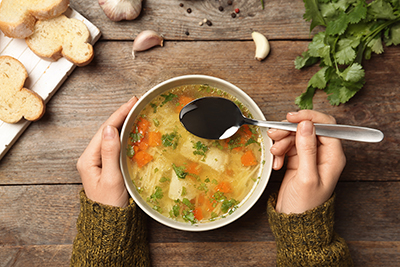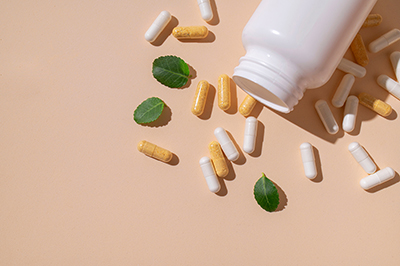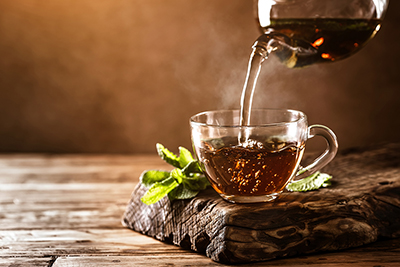Holidays Got Your Gut Down?
From Thanksgiving stuffing to holiday cookies and everything in between, the holidays can be a time that is filled with good company, joy, and an abundance of food. While indulging is part of the joy that comes with the holidays, all the rich meals, late nights, and extra treats can place added stress on the digestive system.
Some Reasons Why Your Gut Could Be Struggling This Season
- Eating richer meals
- Drinking more alcohol
- Overindulging in sugary treats and desserts
- Sleeping less
- Feeling stressed
- Irregular (or skipped) mealtimes
The combination of these factors can overload your digestive system. This can leave you feeling extra tired, bloated, and generally unwell. When your gut isn’t balanced, it can also impact your mood and energy levels thanks to the gut-brain axis; that’s the bidirectional communication between the central nervous system and the gut.
Six Ways You Can Support Your Gut Health This Holiday Season
1. Stick to a routine as often as possible
Eating regular meals (breakfast, lunch, and dinner) can help stabilize your blood sugar levels, providing your body with steady energy to tackle the holiday season.
Tip: Do NOT skip meals because you have events later in the day. Skipping meals can lead to overeating and often leads to intensified cravings for carbs and sweet foods.
2. Balance your plate
Aim for a mix of protein, healthy fats, and fibre (complex carbs and veggies) at each meal. The combination of these foods will:
- Help slow digestion
- Leave you feeling fuller longer
- Prevent blood sugar crashes
3. Stay hydrated
Water helps to break down food and moves things along your digestive tract. Aim for at least 1.5–2 L of water each day. Herbal teas can be part of your total fluid intake (more on herbal teas on page 25).
Tip: Start your day with 1–2 cups of water, before coffee or food.
4. Eat mindfully
Try to slow down, chew your food thoroughly, and eat with minimal distractions. If this isn’t possible for the entire meal (because it often isn’t), try to be mindful for even a few bites. Chewing well activates digestive enzymes in your saliva and works to help support digestion.
5. Keep moving
Regular activity can reduce stress, improve digestion, and keep your bowel movements regular. After lunch and dinner, walks are a great way to kickstart digestion.

6. Managing stress
Stress can slow digestion and lead to gut symptoms like bloating, cramping, constipation, or other changes in bowel movements. Although the holidays can be a joyful time, they can also be quite stressful. It’s important to take time to support your mental wellbeing this holiday season; doing this will also support your digestive health, thanks again to our gut-brain axis. Try any of these:
- Breathe deeply
- Listen to music
- Journal your thoughts or what you’re grateful for
- Be present with those you love
- Remind yourself that it’s okay to say NO when you need a break
What to Do if You’ve Overdone It and Don’t Feel Your Best
Firstly, don’t worry, we’ve all been there! The holiday season is full of opportunities to overindulge. If your digestive system feels off-balance, here are some simple things you can do to support your digestion.
Don’t try to undo what’s already been done
Restricting meals the next day can lead to more cravings. Instead focus on going back to your usual eating routine, focus on adding fibre to your meals, and keeping hydrated.
Move your body
Light activity like walking, stretching, or yoga can help improve digestion, boost your mood, and reduce bloating. Something as simple as a 10-minute walk can make a big difference and leave you feeling a lot better.

Choose meals that are gentler on the gut
After a larger indulgent meal, try these foods:
- Broth-based soups
- Cooked vegetables and lean proteins (cooked veggies can be easier to digest)
- Smoothies with protein and greens
- Herbal teas like peppermint and ginger
Support your liver health
Your liver may be working overtime during the holiday season since you are likely exposed to more alcohol, sugar, and processed foods. You can support your liver’s natural ability to detox by eating cruciferous vegetables like broccoli, cauliflower, Brussels sprouts, beets, and turmeric. Don’t forget to drink lemon water and green tea.
Supplement and teas that can help

1. Probiotics
Probiotics can help with bloating, irregular bowel movements, postantibiotic use, and overall immune system support. They help replenish beneficial bacteria in the gut and support a balanced gut microbiota. The holidays are a time where your gut microbiota may be off-balance because of the increased stress, sugar, and alcohol. If you don’t already consume sufficient amounts of probiotic-rich foods—like yogurt, kefir, sauerkraut, kombucha, or kimchi—a probiotic supplement is your ideal option.
What to look for?
- Probiotic supplements that contain both Lactobacillus and Bifidobacterium strains
- 10–50 billion CFU
- Enteric coating helps protect probiotic strains from stomach acid, allowing more bacteria to reach the intestines alive.
2. Magnesium glycinate or citrate
Magnesium can be helpful for relieving constipation, tension, and digestive issues related to stress. It supports muscle relaxation, which can help reduce the burden on your nervous system and keep things moving along in your bowels.
Magnesium citrate may cause loose stools, so introduce it slowly, ideally in the evening when you are home. Do not exceed 200–400 mg.

3. Herbal teas
Tea | How it helps |
Peppermint | Calms intestinal spasms |
Helpful for bloating and gas | |
Avoid if you have reflux | |
Ginger | Warms and soothes |
Helpful for bloating, nausea, and sluggish digestion | |
Fennel | A great option for gas and reducing postmeal bloating |
Chamomile | Gentle and calming |
Helpful for mild bloating and stress-related digestive issues | |
Lemonbalm or tulsi | Works to calm the nervous system (think gut-brain connection) |
May help soothe some mild indigestion that is related to stress |
It’s normal to indulge during the holiday season, but I encourage you to take time to practice mindfulness, to realize how certain habits and meals affected your gut, and how you felt afterwards. Over the holidays, continue to prioritize hydration, movement, balanced meals, and stress management. This will help keep your digestive system resilient during this busy and joyful time of year. Remember: it’s not about getting this all perfect, it’s about tuning in and listening to your body, giving yourself some grace, and supporting your body so that you can feel good and truly enjoy this holiday season.

Angela Wallace, BSc, MSc, RDN
Angela is a registered dietitian, family food expert, and personal trainer with a passion for helping women and kids thrive through better nutrition. She specializes in weight management and digestive health.
eatrightfeelright.ca
Further Reading
- Cryan, J.F., K.J. O’Riordan, C.S.M. Cowan, K.V. Sandhu, T.F.S. Bastiaanssen, M. Boehme, M.G. Codagnone, et al. “The Microbiota-Gut-Brain Axis.” Physiological Reviews, Vol. 99, No. 4 (2019): 1877–2013.
- de Oliveira, J., J. Ferro, V.H.D. Guimarães, and F.Q. da Luz. “Try not to think about food: An association between fasting, binge eating and food cravings.” Journal of the National Medical Association, Vol. 116, No. 5 (2024): 588–599.
- Miquel‑Kergoat, S., V. Azais‑Braesco, B. Burton‑Freeman, and M.M. Hetherington. “Effects of chewing on appetite, food intake and gut hormones: A systematic review and meta-analysis.” Physiology & Behavior, Vol. 151 (2015): 88–96.
- Cherpak, C.E. “Mindful eating: A review of how the stress-digestion-mindfulness triad may modulate and improve gastrointestinal and digestive function.” Integrative Medicine, Vol. 18, No. 4 (2019): 48–53.
- Jensen, M.M., H.E. Pedersen, K.K.B. Clemmensen, T.S. Ekblond, M. Ried‑Larsen, K. Færch, C. Brock, and J.S. Quist. “Associations between physical activity and gastrointestinal transit times in people with normal weight, overweight, and obesity.” The Journal of Nutrition, Vol. 154, No. 1 (2024): 41–48.
- Konturek, P.C., T. Brzozowski, and S.J. Konturek. “Stress and the gut: Pathophysiology, clinical consequences, diagnostic approach and treatment options.” Journal of Physiology and Pharmacology, Vol. 62, No. 6 (2011): 591–599.
- Zhang, C., J. Jiang, F. Tian, J. Zhao, H. Zhang, Q. Zhai, W. Chen. “Meta-analysis of randomized controlled trials of the effects of probiotics on functional constipation in adults.” Clinical Nutrition, Vol. 39, No. 10 (2020): 2960–2969.
- Hungin, A.P.S., C.R. Mitchell, P. Whorwell, C. Mulligan, O. Cole, L. Agréus, P. Fracasso, et al.; European Society for Primary Care Gastroenterology. “Systematic review: Probiotics in the management of lower gastrointestinal symptoms—An updated evidence-based international consensus.” Alimentary Pharmacology & Therapeutics, Vol. 47, No. 8 (2018): 1054–1070.
- Zheng, Y., Z. Zhang, P. Tang, Y. Wu, A. Zhang, D. Li, C.‑Z. Wang, J.‑Y. Wan, H. Yao, and C.‑S. Yuan. “Probiotics fortify intestinal barrier function: a systematic review and meta-analysis of randomized trials.” Frontiers in Immunology, Vol. 14 (2023): 1143548.
- Tarsitano, M.G., F. Quinzi, K. Folino, F. Greco, F.P. Oranges, C. Cerulli, and G.P. Emerenziani. “Effects of magnesium supplementation on muscle soreness in different type of physical activities: a systematic review.” Journal of Translational Medicine, Vol. 22, No. 1 (2024): 629.

